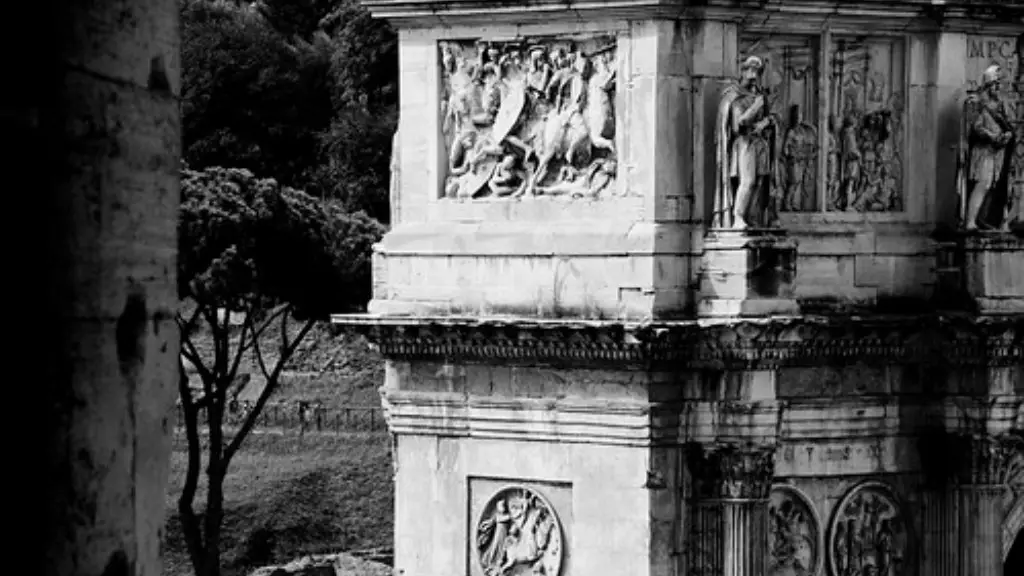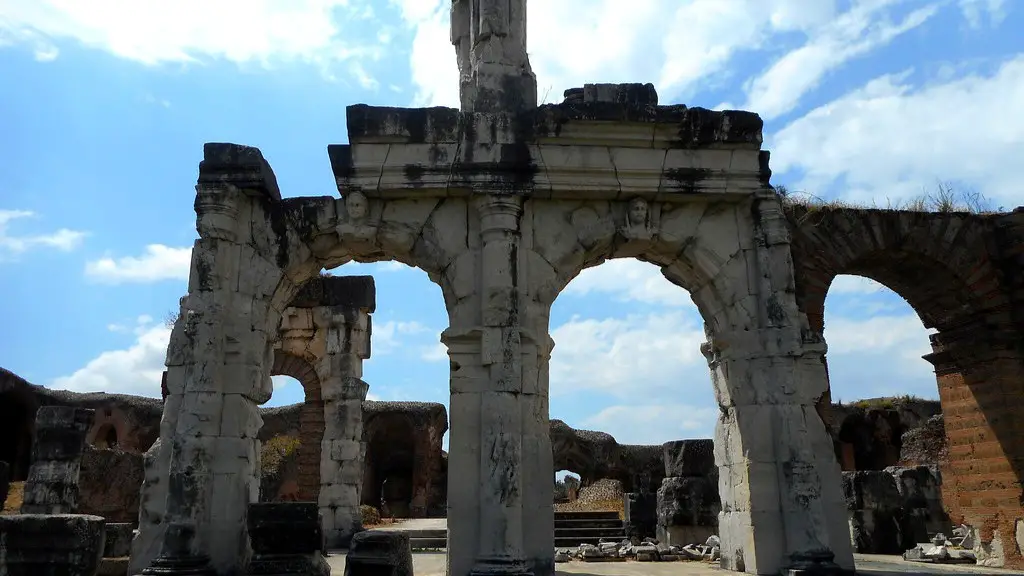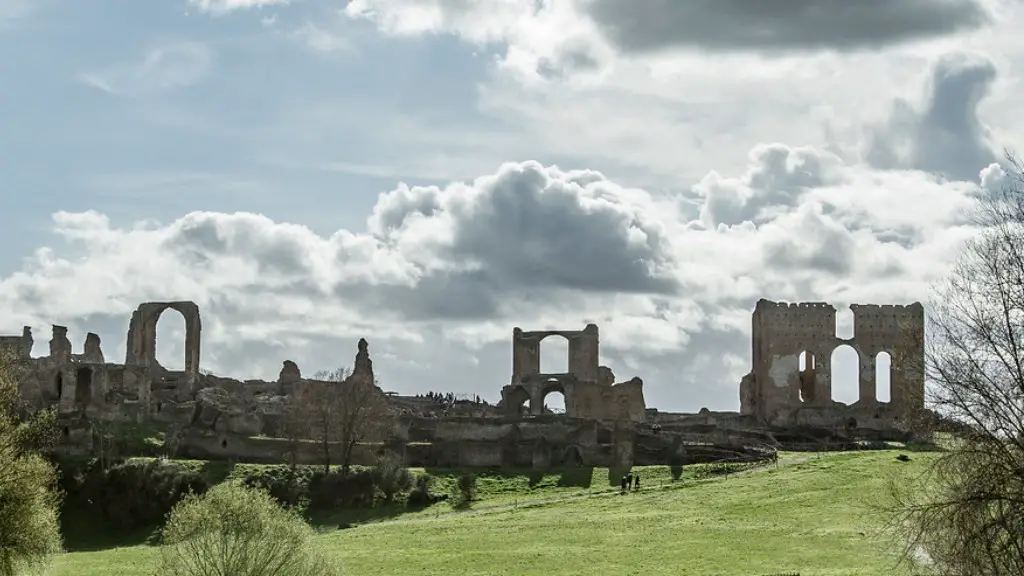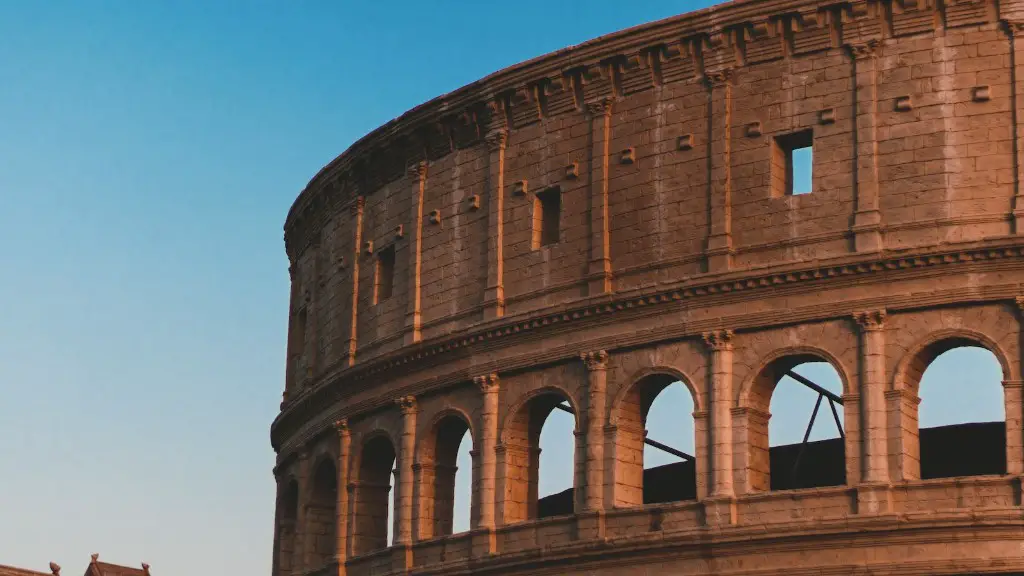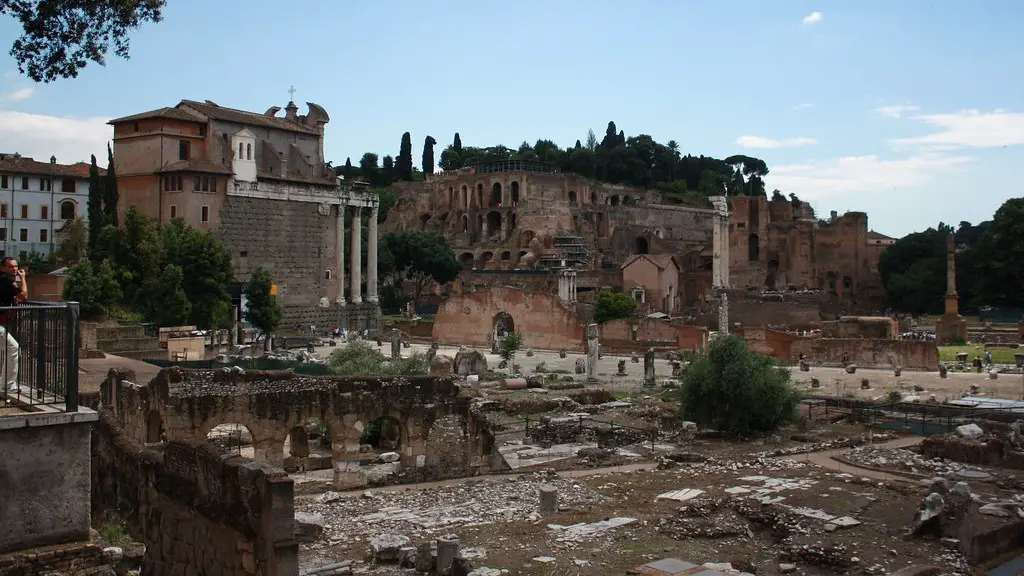The politics of Ancient Rome have been studied for centuries and have a long, tumultuous, and fascinating history. From the early Republic to the late Empire, Rome’s political system was constantly evolving and adapting to challenges while maintaining its essential character.
The Roman Republic was the period between 509 and 27 B.C.E. The Roman Republic was by far one of the most revolutionary democratic democracies in the ancient world. It was founded on the principles of power divided between the two ruling houses, the Senate and People of Rome. The Senate, was a group of 300 ruling members and represented the political, economic and military power. The People of Rome, were made up of all the free citizens.
With the creation of the Republic, a system of government called ‘checks and balances’ was established. This system meant that officials from each branch of government could monitor and check the power of the other branches. This ensured that no one branch was ever able to become too powerful and encroach upon the liberties of the Roman people.
The Roman Republic was successful for hundreds of years, and although it went through periods of reform, it still managed to maintain its integrity until 45 B.C.E. when Julius Caesar took control. Caesar brought with him a new approach to Roman politics. He installed himself as a ‘dictator-for-life’, brought in radical reforms relating to the Roman social structure, and heavily funded public works projects.
While Caesar’s reforms had a positive impact on the Roman economy and social life, his approach to politics was highly unpopular among certain noble families, who were jealous of his power. This led to his assassination in 44 B.C.E. The political reforms he had put in place were then abolished, and the Roman Republic was restored.
The Roman Empire, which lasted from 27 B.C.E. until 476 C.E., was a far cry from the Republic’s system of government. The emperor was at the pinnacle of power, and could overrule or veto any laws or decisions made by the Senate. This meant that the Republic’s ‘checks and balances’ system of government was practically abolished and the Senate was reduced to a mere puppet government.
The Roman Empire also made far-reaching reforms in the areas of taxation, law and order, and religious policy. Religion played a large part in Roman politics, as the emperor was seen as not just a political leader, but a divine figure. The emperor also held the right to grant Roman citizens certain civil rights.
Administration Policies
The Roman Empire had a very well-developed bureaucracy, which was responsible for maintaining order throughout the empire. The bureaucracy also had the important job of collecting taxes and levying fines when needed. It was divided into three distinct branches: the provincial bureaucracy, the praetorium, and the treasury. The praetorium was the branch responsible for legal court proceedings, while the treasury was responsible for the collection and distribution of taxes.
Additionally, the Roman Empire had a complex system of legal codes, which were officially enacted by the emperor. These laws were designed to protect the Roman citizens and to punish any laws breaking. Roman laws were based on Roman customs, but were also heavily influenced by other cultures and religions.
The Roman Empire also maintained a strong military presence throughout its borders. The army was essential to maintaining control over large swathes of land, as well as being a deterrent to would-be invaders. The army was also heavily involved in politics, as the emperors appointed certain generals and senators to high positions of power. This gave them a lot of influence over the decisions made at the imperial court.
Social Politics
In ancient Rome, social status was very important and could shape one’s political decisions. Although the Roman Republic was founded on the principle of ‘equality for all’, the different social classes still had varying levels of political power. The upper classes, or patricians, were the main beneficiaries of political power since they normally held the highest offices in the Senate.
In the Roman Republic, the plebeians also had some political power. They were able to ‘elect’ their own tribunes, who were charged with protecting their rights and interests. In the Roman Empire, free citizens were no longer able to vote, but they still had some influence over the decisions taken by the government.
The lowest classes in ancient Rome were the slaves, who were completely excluded from having any political power. Despite this fact, many of them were able to live important and meaningful lives. Many slaves were freed, given important jobs in the household, and even allowed to establish businesses.
Slaves were, however, excluded from any political discourse, as the Senate and the emperor, believed that it was not in the interests of the Empire to give them any sort of political rights. This exclusion of slaves from politics was one of the major shortcomings of the Roman political system, and would ultimately lead to its downfall.
Political Reforms Over Time
As time went on, the politics of Ancient Rome changed and evolved. Following the death of Julius Caesar, the Senate reasserted its political power and increased the number of tribes from four to thirty-five. This reform allowed for increased representation of the plebeian classes in the Senate.
The late Roman Empire also went through a period of devastating civil wars, which ultimately led to the fall of the Roman Republic and the rise of the Roman Empire. Under the rule of Augustus Caesar, the Roman Empire was able to restore peace and prosperity to the region. Augustus was able to pass a series of reforms, which increased the number of free citizens, decreased taxation, and improved public welfare.
The late Roman Empire also saw the rise of Christianity and its rapid spread throughout the region. Christianity had a major impact on the Roman Empire, as it often clashed with traditional Roman beliefs. Nevertheless, the rise of Christianity could not be denied and it eventually became the official religion of the Roman Empire. This had a major impact on politics, as many of the laws and government policies were based on the teachings of Christianity.
Effects on Modern Politics
The political system of Ancient Rome has had a lasting impression on modern politics. The idea of ‘checks and balances’, which was developed during the Roman Republic, is still used in many modern democracies. Additionally, the idea of a central bureaucracy, which was implemented by the Roman Empire, is still used in many countries today.
In addition, the idea of a ‘divine ruler’, which was embraced by the Romans, is still seen in many societies, where monarchs and presidents are seen as political figures with a certain ‘divine right’. Additionally, the Roman Empire’s legal code is still looked to as an example of how modern laws should be structured.
Finally, the Roman Empire’s vision of a large, multi-cultural society is something that is still a prominent feature in the world today. The Roman Empire’s ability to incorporate different peoples and cultures into one cohesive society is a testament to its political genius. This is something that all modern societies should strive for, and it is one of the major lessons to be taken from the politics of Ancient Rome.
Structuring of Social Classes
The structuring of social classes was a major part of the politics of Ancient Rome. The Roman Republic established a strict class system based on birth, wealth, and political influence. This was done in order to maintain the power of the patrician class, while still allowing the plebeians some influence.
The class system was further reinforced by the Roman Empire, which even went so far as to exclude slaves from any political power. This was done in order to maintain the power and wealth of the upper classes and to ensure that no one was able to threaten their privileges.
The structuring of social classes has a long history and has been used in many cultures. It remains a controversial subject, as it tends to reinforce political and economic power in the hands of the few. This is something that Ancient Rome recognized and as such, it strived to ensure that the upper classes were held in check by the Senate and the people of Rome.
Despite the fact that social classes still exist today, the emphasis is on equality and meritocracy. The politics of Ancient Rome can still, however, serve as a valuable lesson on the importance of ‘checks and balances’, both socially and politically.
Wealth and Power
Wealth and power were both very important in the politics of Ancient Rome. Wealth was seen as a sign of power and status, and as such, it was used to control and manipulate the masses. The emperor and the Senate were able to use their wealth to persuade people to agree with their policies, or to buy off opposition.
In addition, the Roman Empire rewarded those who had achieved wealth or status with titles or positions in government. This gave those in power more control and helped to ensure that their affluent positions were maintained. This system of rewarding the wealthy with titles and positions in the government led to a widespread culture of nepotism, which further entrenched the power of the upper classes.
Despite the fact that wealth and power were important in Ancient Rome, this was not always a positive thing. This was especially true in the increasingly autocratic Roman Empire, where the emperor wielded absolute power over his subjects. This system led to the eventual downfall of the Roman Empire, as even the wealthiest families were powerless in the face of the emperor’s power.
Legacy of Ancient Rome
The politics of Ancient Rome left an undeniable legacy that has shaped the world for centuries. Its legal code was the basis for many modern laws, its system of government was the foundation for many modern democracies, and its vision of a multi-cultural society inspired generations of people.
The politics of Ancient Rome are also a reminder that power can be used for both good and bad. On the one hand, Rome was able to unify many different peoples and cultures and create a strong and prosperous society. On the other hand, it was also able to oppress its own citizens and foster a culture of nepotism and inequality.
Despite its flaws, the politics of Ancient Rome still demonstrate the importance of having a strong and balanced system of government. This is a lesson that is especially important today, as the world becomes increasingly divided and fractured.
